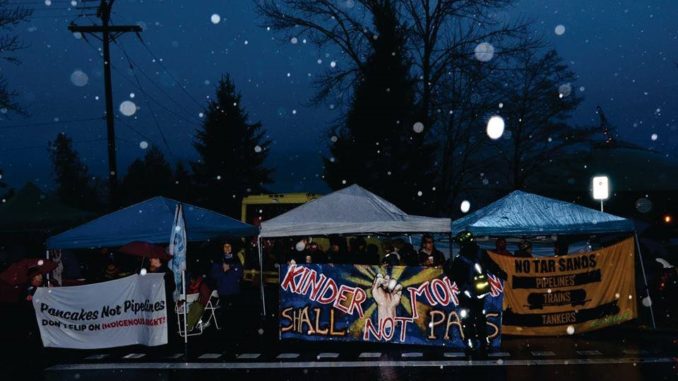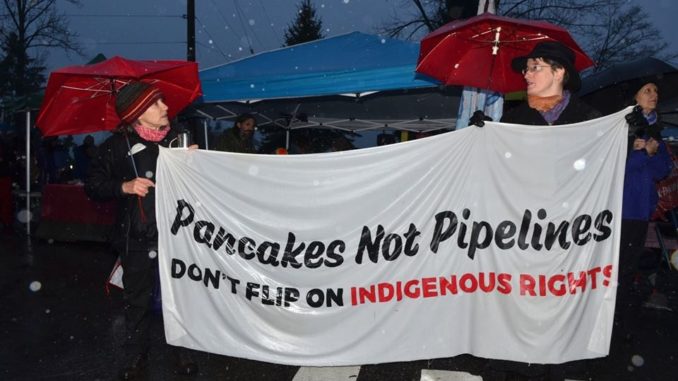
Dozens of Canadian activists hitched a bus ride from Victoria, British Columbia early on January 29th to Texas-based oil company Kinder Morgan’s terminal in Burnaby. There, they had two clear goals: to block the road to the facility and to cook some pancakes.
The two tasks weren’t separate from one another. They both represented a message to Kinder Morgan and Prime Minister Justin Trudeau’s government against a nearly $6 billion project called the Trans Mountain pipeline expansion.
Residents blocked the road to stop construction of a terminal for a project that they view as a danger not only to their communities, but the environment as well. The pancakes represented a peaceful tactic against heightened police presence at anti-Kinder Morgan protests, and some nourishment for activists—and Kinder Morgan workers—as well. Kinder Morgan’s project would see about 900,000 barrels of tar sands oil extracted per day from the Alberta tar sands. Moreover, the firm seeks to add an additional pipeline to the already existing Trans Mountain pipeline built in the 1950s to increase oil for export to countries such as China.
However, construction of the pipeline drew fierce opposition from locals, townships, and provincial officials since the announcement in 2013. Keith Cherry, an organizer that attended the pancake protest, is one of many who have participated in actions against the proposal
For instance, he, along with over 100 other activists, held a four-day march from Victoria, a city in British Columbia, to the Kinder Morgan Westridge Marine Terminal, the same one visited on January 29th, last May. After walking for nearly 50 miles, they chained themselves to the facility’s terminal gates until they were arrested and removed the following day by police.
“Our action shows how ordinary people can and must take direct responsibility for their ecosystems and communities,” Cherry said. “If we don’t, no one else will.”

One issue is the proposed pathway of the project with its proximity to homes and schools. For instance, residents in Chilliwack, a city with a population of nearly 80,000, worry about the pipeline’s location near its aquifer. At a public hearing about the pipeline’s route on January 15th, Rod Sanderson, the deputy director of engineering at Chilliwack Economic Partners Corporation, discussed the importance of drinking water for residents amid the consideration of the project.
“The proposed route is much closer to city wells…and puts the pipeline in the capture zone of the city’s drinking water wells. That means that any contaminants released from the pipeline could flow into the wells,” Sanderson said.
As Cherry explained, there exist far more reasons groups and communities oppose the project. He disagrees with the Trans Mountain pipeline expansion for a few reasons including the increase of ship traffic through the Salish Sea, one of Canada’s most diverse ecosystems. The project would increase the area’s ship traffic to over 400 per year. If an oil spill were to occur, it would “do irreparable damage to the coastline and to coastal communities and nations.”
“Even if no spill occurs, this pipeline facilitates the burning of a massive amount of fossil fuels, speeding up the already out-of-control process of human-induced climate change. Building this pipeline represents a serious threat to the planet’s climate,” he said.
Furthermore, there exists the issue of consent. Around 60 First Nations indigenous communities have objected to the project’s construction. Despite such opposition, federal regulators and some government officials have permitted construction to occur.
Reuben Garbanzo, an anti-pipeline organizer, highlighted the Canadian government’s dark history involving indigenous communities. Indigenous rights, that include objecting to projects on First Nations lands, that are promised to them by authorities are more often rhetoric than actual policy.
“When the Canadian government talks about respecting the rights of indigenous people, that should mean no means no. If there is no consent, that should constitute a veto against large-scale energy developments on unceded First Nations territory,” he said.
He referred to Kinder Morgan’s ability to circumvent provincial authorities, who oppose Kinder Morgan’s project, to expand terminal infrastructure at Westridge after being given a permit by federal regulators. Yet, this land also falls under the territory of the Tslei-Waututh Nation, a First Nations group that disagrees with the proposal.

Perhaps the best indicator of this conflict between indigenous people and federal authorities is the rhetoric of Prime Minister Justin Trudeau, who approved Kinder Morgan’s project last year.
In public, Trudeau warns the dangers of climate change and urges immediate action before further catastrophe occurs. Last September, at a United Nations General Assembly meeting in New York, the Prime Minister told those in attendance that every country must assume responsibility of “the challenge and reality of climate change.”
“For our part, Canada will continue to fight for the global plan that has a realistic chance of countering it. We have a responsibility to future generations, and we will uphold it,” Trudeau said.
Yet opponents of the Kinder Morgan project do not agree with Trudeau’s public persona as a climate warrior in the international community.
Garbanzo found Trudeau’s language puzzling as it contrasted with his actions. Furthermore, he found it impossible to meet both the goals established in the Paris climate accord, which Trudeau signed in 2016, and expanding Canada’s use of fossil fuels.
“One of the key slogans often heard at protests heard in Canada is that climate leaders don’t build new tar sands pipeline infrastructure,” Garbanzo said.
He felt, as a Canadian, embarrassed over a decision that would export bitumen oil—considered one of the dirtiest energy sources in the world—to a country investing in green energy.
“We are one of the countries with one of the highest carbon footprints in the world. We have a responsibility to keep the Alberta tar sands in the ground,” he said.
Protests are set to continue throughout British Columbia as Kinder Morgan seeks even more permits to complete its pipeline. Many municipalities are hesitant to provide access to Kinder Morgan for land access despite federal approval.
In addition, the Canadian Supreme Court will hear challenges from mostly First Nations communities invoking Section 35 of Canada’s Constitution, which establishes the rights of indigenous people, and the United Nations’ Declaration of the Rights of Indigenous Peoples. They hope to ensure Kinder Morgan cannot obtain access on their lands without consent. Decisions on these cases may come as early as spring of this year.
Anti-pipeline activist Cherry feels optimistic that the pipeline will be stopped with pressure coming from many communities against the project and from elected officials in British Columbia.
He recalled a similar project called the Northern Gateway pipeline that was rejected by Justin Trudeau in 2016. Cherry explained how public opposition helped ensure the project’s demise. Now he expects the Trans Mountain pipeline expansion to face a similar fate.
“We have a long and illustrious tradition of civil action here in British Columbia,” Cherry said. “I am very confident that this pipeline will not be built.”
Brandon Jordan is a freelance reporter in Queens, NY. He’s written for The Nation, Waging Nonviolence, In These Times, and more. Follow him at @BrandonJ_R.
